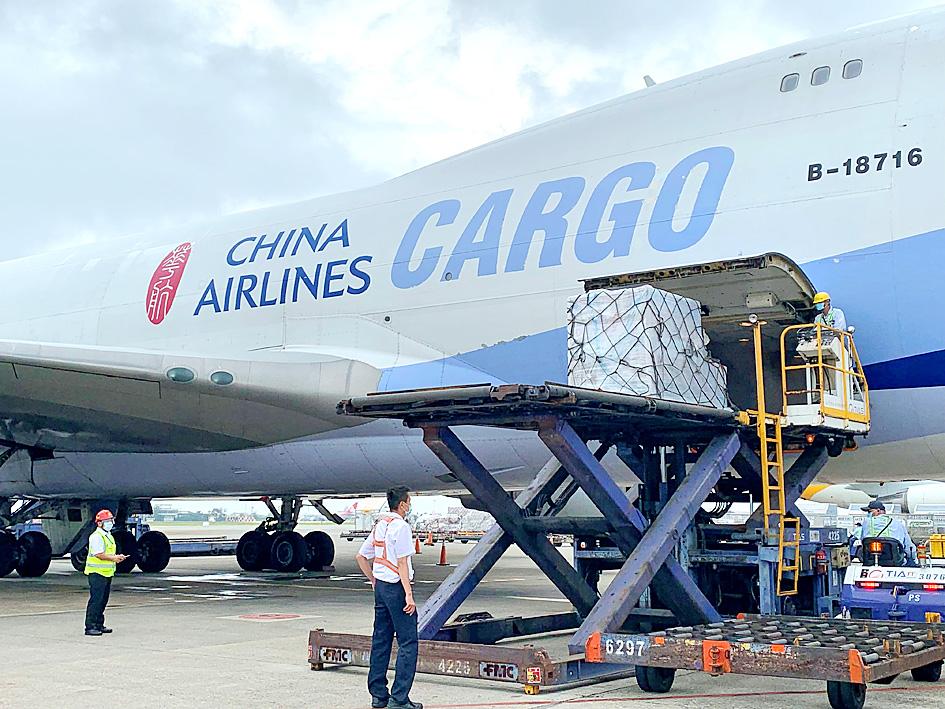Taiwan Ratings Corp (中華信評) on Thursday raised its outlook on China Airlines Ltd (CAL, 中華航空) from “negative” to “stable” on expectations that the nation’s largest air cargo operator would benefit from elevated cargo demand and strong air freight rates next year, it said.
The local arm of S&P Global Ratings forecast demand for air cargo to remain at a comparatively high level next year due to strong consumer demand in the US and Europe, growing trade volume and ongoing disruption of sea shipping, it said in a report.
Because of Taiwan’s favorable geographic location in Asia, CAL is likely to receive high orders over the next 12 months, it said.

Photo courtesy of China Airlines
A quick recovery in air cargo capacity is not likely, as air travel would still be subdued, limiting the cargo capacity offered by passenger flights; therefore, CAL’s cargo load factor is expected to stay above pre-COVID-19 pandemic levels, and air freights rates are forecast to continue to stay at strong levels this year, the company said.
Air travel could slowly pick up next year, given that some Asian countries have reopened international travel, but improvement of passenger traffic for CAL is expected to be limited in the first half of next year in light of ongoing border controls and quarantine requirements for international tourists, Taiwan Ratings said.
However, many governments plan to ease their restrictions after their vaccination rates reach sufficient levels, laying ground for rebounding passenger flights, the company said.
Taiwan Ratings holds a mixed outlook for CAL for 2023. The ratings agency is upbeat for CAL’s passenger business, but holds conservative expectations for air cargo business.
It forecasts air cargo demand to soften in 2023 and 2024, as disruption of sea shipping should ease, and demand from developed countries to restock could also fall after their inventory-to-sales ratios return to adequate levels from the current historic lows; therefore, cargo rates should retreat, casting pressure on air cargo yields, it said.
However, passenger traffic would likely accelerate its recovery in 2023 on the back of resumed demand for leisure travel, and the rebound in passenger flights should help CAL mitigate the impact of a possible decline in cargo revenue and support the airline’s cash flow generation, it said.
Intra-Asia flights were the biggest revenue contributor to CAL before the pandemic, constituting about 70 percent of the airline’s passenger revenue, it added.

STIMULUS PLANS: An official said that China would increase funding from special treasury bonds and expand another program focused on key strategic sectors China is to sharply increase funding from ultra-long treasury bonds this year to spur business investment and consumer-boosting initiatives, a state planner official told a news conference yesterday, as Beijing cranks up fiscal stimulus to revitalize its faltering economy. Special treasury bonds would be used to fund large-scale equipment upgrades and consumer goods trade-ins, said Yuan Da (袁達), deputy secretary-general of the Chinese National Development and Reform Commission. “The size of ultra-long special government bond funds will be sharply increased this year to intensify and expand the implementation of the two new initiatives,” Yuan said. Under the program launched last year, consumers can

Citigroup Inc and Bank of America Corp said they are leaving a global climate-banking group, becoming the latest Wall Street lenders to exit the coalition in the past month. In a statement, Citigroup said while it remains committed to achieving net zero emissions, it is exiting the Net-Zero Banking Alliance (NZBA). Bank of America said separately on Tuesday that it is also leaving NZBA, adding that it would continue to work with clients on reducing greenhouse gas emissions. The banks’ departure from NZBA follows Goldman Sachs Group Inc and Wells Fargo & Co. The largest US financial institutions are under increasing pressure

TRENDS: The bitcoin rally sparked by US president-elect Donald Trump’s victory has slowed down, partly due to outflows from exchange-traded funds for the token Gold is heading for one of its biggest annual gains this century, with a 27 percent advance that has been fueled by US monetary easing, sustained geopolitical risks and a wave of purchases by central banks. While bullion has ticked lower since US president-elect Donald Trump’s sweeping victory in last month’s election, its gains this year still outstrip most other commodities. Base metals have had a mixed year, while iron ore has tumbled, and lithium’s woes have deepened. The varied performances highlight the absence of a single, over-riding driver that has steered the complex’s fortunes, while also putting the spotlight

Twenty years after he was a young, struggling actor in Toronto, Thomas Lo (盧瑞麟) is now the one giving young Asian actors their big breaks. He just had to go to Hong Kong to do it. The Chinese Canadian has been the creative director of one of the territory’s biggest TV broadcasting companies for only a few years, but is already making original English-language content to reach viewers around the world. “It was a bit of a full-circle moment for me,” Lo said. “You see more Asians, but you’re still seeing the same Asians on screen, right? We’re looking for more opportunities